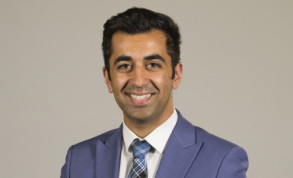Scottish government offers 5% pay rise
 The Scottish government said the offer, backdated to 1 April, was the largest in a single year since devolution. It would mean rises of between £1,000 and £2,400 a year. While most staff would receive 5%, those in band 1 would get a 5.36% increase in 2022/23, while staff on band 2, point 1, would see a 5.05% increase.
The Scottish government said the offer, backdated to 1 April, was the largest in a single year since devolution. It would mean rises of between £1,000 and £2,400 a year. While most staff would receive 5%, those in band 1 would get a 5.36% increase in 2022/23, while staff on band 2, point 1, would see a 5.05% increase.
Health secretary Humza Yousaf (pictured) claimed staff in Scotland were the highest paid in the UK. ‘Our AfC workforce have long had the best pay and conditions in the UK, and, with today’s offer of a 5% pay rise, we’re demonstrating our commitment to ensuring that continues to be the case.
‘It is a demonstration of how much we value our NHS staff who have worked tirelessly to keep us safe during the course of the pandemic.’
He added: ‘The UK government would need to deliver pay uplifts of between 6% to 14% to frontline NHS England AfC staff to catch up with pay levels in Scotland,’ he said.
The Royal College of Nursing said that negotiations had ended on 14 June without agreement, but with the Scottish government making a final offer of 5%. The trade unions will now consider their options, but they had been asking for a pay rise equivalent to the retail price index (RPI) plus 5%.
The government uses the consumer prices index (CPI) as its main measure of inflation, which tends to be lower than RPI as it has a narrower definition. In April, CPI was 9% while RPI stood at 11.1%.
Julie Lamberth, RCN Scotland chair, said: ‘This offer falls far short of our expectations of a fair pay award of RPI plus 5%. Our members demonstrated their worth many times over during the pandemic. They have put their own health and wellbeing on the line day after day, month after month. They continue to do so as we move into remobilisation and recovery.
‘They deserve an above-inflation pay award that recognises their safety-critical role and makes up for years of pay restraint.’
The Chartered Society of Physiotherapy’s Claire Ronald said the offer was disappointing. ‘It is frustrating that it has taken so long for us to get to this point. It falls short of the pay claim by unions and is inadequate in the face of steeply rising inflation and a cost of living crisis.’
The society had been calling for a comprehensive retention package, which includes a pay rise that recognised health workers’ skills and their value. This was particularly important to physiotherapists as the average rate of those leaving the NHS had been higher than any of the other allied health professional groups, it said.
A member consultation on the offer will begin on 20 July, with a vote to follow.
An announcement on pay in England is due soon, though the government has insisted the pay review body should recommend no more than a 3% rise. Last week, an NHS Providers survey reported that most trusts in England had budgeted for a 3% pay rise but were not confident they could afford more.
Trusts backed a significant rise to support staff recruitment and retention, with 28% believing it should be 5% or more. There was also concern that the pay rise should be fully funded – a partially funded increase would mean cutting some services to patients.
In 2021/22, the average increase for AfC staff in Scotland was 4%. In England it was 3%. On top of this, staff in Wales received an additional day of annual leave, plus – for staff in bands 1-5 – an extra non-consolidated 1%. In Northern Ireland, AfC staff received 3% initially, though it was later announced that substantive workers would get an additional, non-consolidated sum of 1.5% (bands 1-3), 1% (4-7), or 0.5% (all other directly employed staff).
Related content
We are excited to bring you a fun packed Eastern Branch Conference in 2025 over three days.
This event is for those that will benefit from an overview of costing in the NHS or those new to costing and will cover why we cost and the processes.